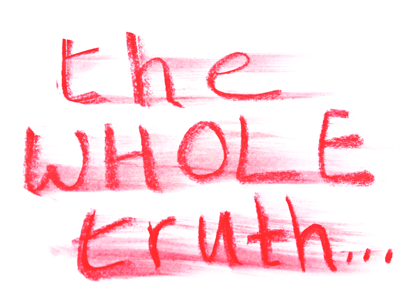Michèle Cooke
The only incontrovertible truths are birth and death.
They are the truth of our bodies. No one can deny them: not we ourselves, not anybody else. Even though the ‘moment life begins’ or the ‘time of death’ cannot be exactly determined. It does not matter. Life begins at the latest at birth and ends at the latest when our bodies no longer function.
The essential truths are somatic. Pain, joy, love. We cannot escape them. Our bodies tell us, whether we want them to or not, what the truth is. Missing someone causes pain. It causes pain because we love them. Being with them creates joy, makes us joy-full. This joy can only be felt. It cannot be thought. It cannot be pretended. Anyone who has tried to tell themselves they are happy knows that.
Can there be equations for love? War? Pain? What truth can they contain?
Reality: perhaps we can talk ourselves into it, into thinking, believing. But it is what we do that is real. And we do it with all of our selves, not divorced from our bodies. The flesh and bones and chemistry of who and what we are. We may be able to talk ourselves into believing a reality. But reality is what we cannot talk ourselves out of. However much we try.
The mathematician and pacifist Lewis Fry Richardson tried to give us numerical explanations, definitions (?) of war and love. He was committed to furthering and improving the human condition. Can numbers, or words tell us the truth of life, of living? Or at least a truth?
Equations: general rules, principles. They have to leave out the variables, the messy bits that constitute each lived life. What happens if, when, we take them for true?
Words: Whether we put things into them, or strive to find words that express what we feel or think, they never will. There will always be and always has to be a gap, a mismatch. No words can tell the truth. Even if we knew what our truth was. For the moment it reaches the surface, comes out of us, it evaporates. The best we can do is strive towards it.
That is why all truths, once they are uttered, are only partial truths. Even the most honest, most innocent. All truths are indirect. They are not untrue. Only un-voll-endet, un-full-filled, in imperfect mode.
‘… a collection of truths may be balanced against an opposing collection of truths, and while they do not cancel each other out, they can be opposed and true … they are never true beyond their moment, their special circumstance and their perspective … Truths are neither transient nor permanent, but both, depending on the value we give them, and our constancy.’
J. Kirschbaum
When we engage the body, become ‘physically involved’, we voluntarily run the risk of opening up our ‘uncontrolled’ truths. (This of course is fed by the illusion that we do indeed have ‘control’ over what we think and say). In fact our words are much more the product of spontaneous combustion, of ad hoc perturbations, than we dare to contemplate.
Physical so-called ‘intimacy’ without emotional nearness, without meeting, leaves our illusion of control intact. The reality is, though, that the very illusion of control, refraining, abstention, merely camouflages the perturbations that inevitably occur with living, and they erupt even more beyond our grasp or ‘control’. Anaesthesia can only work short-term. Otherwise it leads to death.
It is in the extremes, when words fail us, that we can glimpse, or perhaps even find, for the time being, our own truth. In the crisis of conflict, in the conflict of crisis. When rules, precepts, beliefs no longer work, no longer give us guidelines or any point of reference. It is then that we are thrown back on our own resources. On the essence of who we are, our psycho-somatic foundations. In the crisis of catastrophe, dis-harmony, we clutch, not at straws, but at anything solid that can help us get back to an even keel. ‘Character is revealed in crisis’ Perhaps. Or is it hard truth that breaks out, breaks open in crisis? Is that the same thing?
‘Plus la douleur pénétrait avant, plus intime et plus vrai sembla être le témoignage de la chair et du sang’
Henri Wallon
Pain happens when our bodies are in disarray. For whatever reason: ‘mental’, emotional, chemical. But of course, in the end everything is chemistry.
Happiness, joy, is the release from pain, from disturbance, from dis-harmony. It is not the absence of pain or irritation. When we numb ourselves to pain we cannot feel release, cannot feel joy.
Equations, and everything you put into words, into figures, is truth that is out there. Out there, outside the words we use, outside the numbers that we put together. Truth is what is there outside the boxes inside us. Truth is what we can't get away from, what we cannot think away: birth, death love, pain, anger, joy. The somatic residue. What remains when there are no words left.
We ignore it at our peril. We can pretend it's not there. But pretending, ignoring is acknowledging its existence. Once it's there it's there. There is, then, nothing more to say.
Simple
It's not
Empty
The hollow
In my chest
But always
Full
Of you.
Aches
With need
To hear
You say my name,
Just look
Into your smile.
Never understood
Before
How nothinginess
Can hurt
So that's it,
Then,
The place
Where something's
Meant to be
This is the
Pain
That tells you
What it is
You need
All else just
Lust
Desire
Want.
Heart
Broken
Open
Gaping
Void
With being
Without you.
So that's it
Then,
The hollow in my chest
Filled with aching
Emptiness.
Isabel van Langenberg
Crisis, pain, disharmony are the conditions for glimpsing and, perhaps, living, our truth. Because it is when words, numbers, rules fail us that the superstructures of discursive reality crumble. It is then that we are left naked. Without shelter. Happiness is the fleeting moment when we recognise our truth. All the rest is pretending. Or striving.
See also:
Hannah Arendt:
‘ ... the given raw material of sheer happenings’
‘ ... we may call truth what we cannot change... it is the ground on which we stand and the sky that stretches above us.’
From: Truth and Politics
Some sources:
Lewis Fry Richardson: The mathematical psychology of war, 1919
Thank you to John Fenton and his paper: Pieces of parsnip, war, and falling in love (2005), which introduced me to Richardson.
Henri Wallon, Histoire de l’esclavage dans l’antiquité. 1847 (I, p. 325; quoted from Hannah Arendt, The Human condition,1998, Univ. of Chicago press, London, p. 129, footnote 78)

